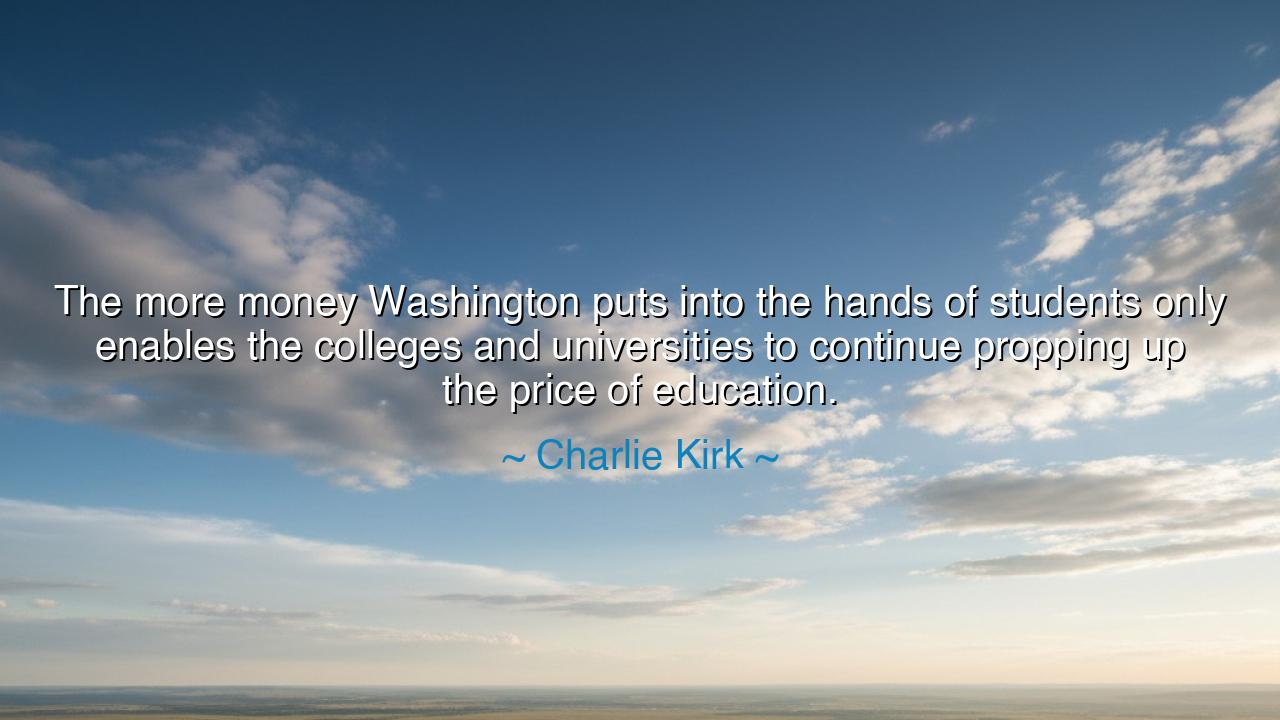
The more money Washington puts into the hands of students only
The more money Washington puts into the hands of students only enables the colleges and universities to continue propping up the price of education.






The words of Charlie Kirk—“The more money Washington puts into the hands of students only enables the colleges and universities to continue propping up the price of education.”—strike as both warning and lament, for they unveil the hidden chains within a system that was meant to liberate. Education, once proclaimed as the ladder by which the lowly could rise, has become for many a burden of debt, a weight that shackles rather than frees. Kirk’s words point to the paradox: that aid intended to help students may, in truth, fuel the very fire that consumes them, for colleges raise their prices to absorb what the state provides, and the cycle of burden grows unbroken.
To speak of Washington putting money into the hands of students is to speak of grants, loans, and subsidies—the well-intentioned efforts of government to widen the gates of learning. Yet when institutions respond not by lowering barriers but by lifting costs, the aid becomes a mirage. Students believe themselves helped, but they are led into deeper debt, while universities grow fat on endless streams of funding. Thus, what was meant as blessing becomes burden, what was meant as freedom becomes bondage.
History offers us parallels. Consider the days of Rome, when grain subsidies were given freely to the people. At first, they relieved hunger; in time, they dulled initiative and swelled corruption. The empire fed its citizens bread, but in so doing, empowered the very systems of waste and exploitation that hastened its decline. So too in our own age: if aid is given without reform, if generosity strengthens inefficiency, then the sickness deepens rather than heals. This is the essence of Kirk’s lament—that colleges and universities thrive, but the student, the very soul of the enterprise, suffers.
The price of education rises like a tower without end, each year demanding more coin, each year defended by new justifications. The libraries grow taller, the campuses richer, the administrators more numerous, but the students, for whom this grandeur supposedly exists, leave with debt that haunts their youth, their marriages, their futures. To feed this system endlessly without demanding accountability is to build golden palaces upon the backs of the young. What, then, is the worth of knowledge gained at such a cost, if its first fruit is despair?
And yet, let us not fall into despair. For Kirk’s warning is also a call to action. It reminds us that knowledge must be pursued wisely, and systems of learning must be purified lest they consume those they are meant to serve. Aid must be paired with reform; institutions must be made lean, honest, and true to their mission. The goal is not to abandon students, but to demand that education serve them rightly, without deceit or exploitation. The flame of learning must be kept pure, lest it burn those who come too close.
What lesson, then, shall we carry? That generosity without discernment is folly. That systems must be judged not by their splendor, but by the fruits they bear in the lives of the people. And that true education is not measured in towers of brick or swelling endowments, but in the freedom it grants to minds and souls. If the price enslaves, the purpose is lost. Let every society remember this: education is a path to liberty, not a snare of debt.
So, O listener, act with wisdom. If you are a student, seek knowledge, but weigh its cost. If you are a leader, give aid, but demand reform. If you are a citizen, hold institutions accountable, that they may not grow bloated at the expense of the young. For only then will the promise of learning be restored, and education will again be what it was meant to be: the great equalizer, the beacon of freedom, the ladder by which every soul may rise.
In this, Kirk’s words are not merely a critique, but a charge: to guard the purity of education, to break the cycle of inflated costs, and to restore honor to the halls of learning. For when education is just, society flourishes; but when it is corrupted, both students and nations suffer. Choose then the path of reform, and let knowledge serve freedom once more.






AAdministratorAdministrator
Welcome, honored guests. Please leave a comment, we will respond soon